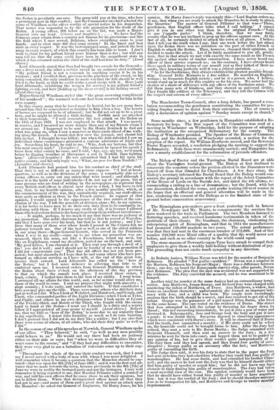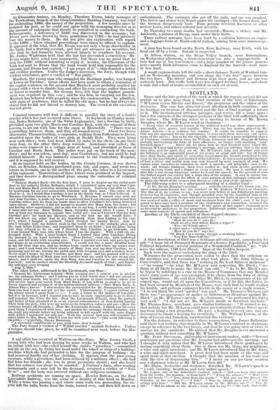At Bodmin Assizes, William Nevan was tried for the murder
of Benjamin Robinson. He pleaded "Not guilty—accident." Nevan was a corporal in the Marines, Robinson his Sergeant-Major ; there was a difference between them ; one day, on board the Runnymede convict-ship, after parade, Nevan shot Robinson. The plea that the shot was accidental was not supported by the evidence. The Jury convicted the accused, and he was sentenced to be hanged.
Another trial for murder at the same Assizes had an extraordinary termination. Ann Matthews, James George, and Richard Jose were charged with murdering the infant of Matthews, at Truro. Ann Matthews, a widow, had borne an excellent character ; unfortunately she formed an improper intimacy with Jose, and a child was born. The couple were exceedingly anxious that the birth should be a secret, and Jose resolved to get rid of the infant. George was the paramour of a girl named Eliza Burns, who lived in the same house. The case rested on the evidence of Burns. She stated that Jose attempted to kill the infant by thrusting his finger down its throat ; this not succeeding immediately, he put it into a pan of water and drowned it. Subsequently, Jose and George took the body and put it into a pond ; it was found there. Surgeons deposed to observing appearances which were consistent with Burns's story. It will be observed that if Burns told the truth, Jose committed a murder ; if IT story could not be relied on, the homicide could not be brought home to him. After the Jury had retired, they sent a note to Mr. Baron Martin ; the Judge consulted with Sergeant Channel', and then sent an answer to the Jury ; in a few minutes he sent for them into court, and begged them not to be guided by any opinion of his, but to give their verdict quite independently of it. The Jury then said they had agreed, and they found Jose guilty of manslaughter; George guilty as an accessory after the fact ; and Matthews guilty of concealing the birth. The Judge then said, it was his duty to state that in the paper the Jury had sent in to him they had asked him whether they could find Jose guilty of manslaughter. He had some doubt, and had consulted his brother Channel' ; and the answer he had sent the Jury was that he himself should either find him guilty of murder or acquit him ; but he did not know any legal obstacle to their finding him guilty of manslaughter. The Jury had taken a most merciful view of the case. His opinion certainly would have been that he should have either found him guilty of murder or have acquitted him : but it was the verdict of the Jury ; and he should therefore sentence Jose to be transported for life, and Matthews and George to twelve months' imprisonment,
At Gloucester Assizes, on Monday, Theodore Evans, lately manager of the Tewkesbury branch of the Gloucestershire Banking Company, was tried for embezzling 15001. the money of the proprietors. A few months since he resigned his Post, as he could not agree with the managing director as to the amount of enterprise that should be permitted in conducting the bank. Subsequently, a deficiency of 3250/. was discovered in the accounts ; but Evans gave cheeks drawn by three gentlemen for 17501.—he had privately lent the money to them. He did not give any explanation with to the 1500/. ; when criminal proceedings were taken he offered to exp
it appeared at the trial, that Mr. Evans was not only a large shareholder in the 1-ang, had a drawing account, and had got advances on securities, but tat, that he had formerly been allowed largely to overdraw his account. Mr. Justice Wightman held that the last fact prevented a conviction :Mr. Evans might have acted very improperly, but there was no proof that he took the 1500/. without intending to repay it : besides, the Chairman of the bank had said to Evans that the bank would hold him responsible for the amount, and Evans had replied, "I am aware of it"--this denoted a debtor and creditor position. Under the Judge's direction, the Jury, though with evident reluctance, gave a verdict of' Not guilty."
Murdock, the young man who strangled the Hastings gaoler, was hanged at Lewes on Tuesday. Great efforts had been made to obtain a remission of the capital sentence, on the ground that Murdock most probably assailed his keeper with a view to disable him and effect his own escape, rather than with an intent to murder him. Sir George Grey felt that the highest punishment was required in this case ; and he was fuin in carrying out the law. Murdock has behaved with-propnety since his condemnation : he admitted, with signs of penitence, that he killed the old man ; but he has always declared that he did not intend to destroy him. The crowd at the execution was not great.

























 Previous page
Previous page